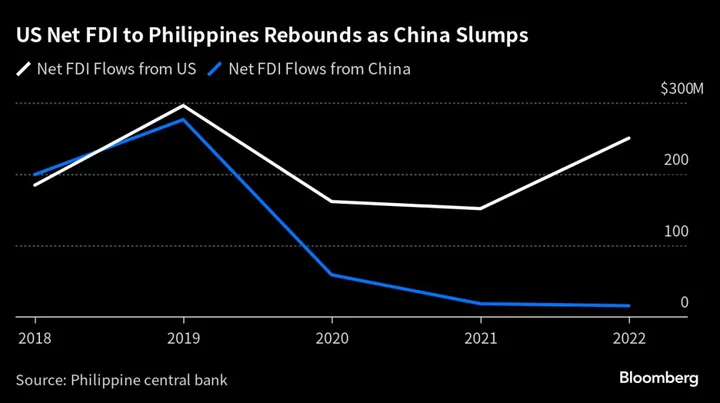The Philippines’ stronger defense relations with the United States can help unlock business deals for the Southeast Asian nation as Washington and its allies seek alternatives to China, according to Manila’s envoy to the US.
“The basis for better economic ties with the US now is our relationship on the defense side,” which Ambassador Jose Manuel Romualdez described as “clearly balanced” under President Ferdinand Marcos Jr. compared to periods in the past when the US may have taken the relationship for granted.
“If we are able to get a large portion or even at least a slice of that American pie, that will be significant for us,” Romualdez said in a Zoom interview on Monday, referring to investments. “I’ve not seen this enthusiasm for the Philippines from US investors. It’s a consequence of our enhanced defense ties,” said the envoy who’s a cousin of Marcos.
At stake for the US’ oldest ally in the Indo-Pacific region is its domestic security and sovereignty amid China’s encroachment over disputed waters and as tensions over neighboring Taiwan rise. The Philippines, one of Asia’s fastest-growing economies, is also competing with neighbors for a share of the billions of dollars of chips investments that may spread out from China and Taiwan.
The US views the Philippines as a key part of its strategy to prevent China from pursuing military actions particularly in Taiwan, according to Romualdez. The chances of a dangerous encounter in Taiwan “isn’t that high, but it can happen,” he said.
US companies are particularly looking to tap the Philippines to produce semiconductors, Romualdez said. Manila is seen by American firms as a place that they can “trust” with their operations and expansion, he said, following President Joe Biden’s enactment of a law to boost America’s capacity and rival China in the sector.
The US will likely dispatch a high-level trade and investment mission to the Philippines by yearend, according to Romualdez.
With neighbors like Vietnam, Thailand and Indonesia also seeking investments, the Philippines will have to ease foreign ownership restrictions and provide perks to woo US businesses, the ambassador said.
The Philippine envoy lashed out against critics of Marcos’s foreign policy especially against the backdrop of elevated tensions over the South China Sea that has prevented Filipino fishermen from venturing out to the sea.
“Some people may have the wrong notion that the President is siding with one side to the detriment of the other,” Romualdez said of Marcos’s foreign policy. “Not true at all. He is trying his best to balance our relationship between the United States and China.”
At the same time, the Philippines can’t just sit around and look while Chinese vessels intrude into its territories, he said, days after the Philippines reported fresh encounters and “swarming” of Chinese vessels. China’s recent actions near an oil and gas-rich area in contested waters may be a prelude to occupation, a Philippine Coast Guard official said over the weekend. Beijing has said its activities were legitimate.
As for Taiwan, the Philippines is “part of that deterrence posture that the US would like to have with China,” Romualdez said. “It’s very important not only for the US but also for all like-minded allies in the Indo-Pacific region that the Philippines plays a role.”
Marcos’s government earlier this year granted the US expanded access to military sites, including those near Taiwan, as part of efforts to strengthen a longstanding alliance that was strained during the term of former President Rodrigo Duterte.
The US — which has allocated more than more than $100 million to upgrade military sites — is committed to developing these areas, Romualdez said. It’s also working on maritime patrols with the Philippines in the South China Sea hopefully within the year and will also help Manila buy hardware to strengthen its military, he said.
“The foreign policy that we have right now in my view is the right move,” Romualdez said. “We’re not looking for trouble; we are looking for business. Now, who is the one that’s making trouble?”
--With assistance from Cecilia Yap and Manolo Serapio Jr..

